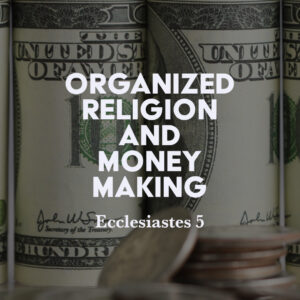Ecclesiastes 5: Organized Religion and Money Making
October 7, 2022
TODAY'S BIBLE READING:
Jeremiah 14-15, Ecclesiastes 5, John 2:12-25, James 3:13-18

In this search for the meaning of life, the “teacher” has been attempting to prove his hypothesis. The theory that he is testing is that life “under the sun” (that is a life that is orientated around confidence only for this world and this life, and with minimal connection to God) is fundamentally meaningless. His conclusion will be, in chapter 12, that therefore the only meaningful life to live is one that is lived for God.
Now the question comes, what about religion? What about the activities of chapel and church? What about worship? And what we find in the first part of this chapter 5 (up to verse 7) is that even that, even religion, when performed in an “under the sun” way is also essentially meaningless. This “earthly,” “secularized,” non-transcendent view of religion is deeply disappointing. “God is in heaven and you are on earth, so let your words be few” (5:2). That is a description of the relationship between God and his people that David in his Psalms would never have used: God’s people have a relationship with God, they walk with God, they know God, they are protected by God. But if we approach even religion in an “under the sun” way, then all we are left with is “God is up there” and “you are down here” so “let your words be few.” Instead, we are to “fear God”—which is the solution that will be explained in greater detail at the end of the book in chapter 12.
It is no wonder that some people find religion disappointing. There are people who hate organized religion—and for good reason. Some organized religion is little more than a meaningless exercise in humanistic piety with no real answers to the great questions of life. The Bible is not for that kind of religiosity. But, faith, hope, and love; the power of God’s Spirit; the presence of his person with us: all these gifts of a true connection with God and relationship with him are beyond beautiful and beyond description. The point then of this first half is to ensure that our relationship with God is biblical; that we know God; that we have his Spirit within us; that we are in community with a true biblical church and not merely a “religious organization.”
The second part of this chapter focuses now on the meaninglessness of money. There is a system, a world system, of hierarchy and “kickbacks” so that one person is oppressed by another person who in turn is oppressed by another person. And the person who has much money, though, “never has enough.” As the “teacher” tells us: “this too is meaningless.” The more you have, the more dependents you will have. You come into this world with nothing, and you will leave this world with nothing. The best you can hope for is not to amass more and more money (for that is meaningless) but to enjoy your life and your work, and not then reflect on the fact that the work you’re doing is meaningless!
Hardly encouraging ideas! But, “under the sun,” this is the reality. This is what life is like for someone who is not a real Christian. This is what life is like for someone who doesn’t know the power of Jesus’ resurrection. They may not realize this is what life is like, which is why Ecclesiastes is such a good evangelistic book. It brings us to our senses and helps us realize what life is truly life. It does not sugarcoat anything. This is life, it says. Don’t you agree? Aren’t we now being “real”? What other conclusion can you come to?
And therefore, Ecclesiastes drives us to come to Christ and find meaning in our relationship with him. And if we are already a Christian, Ecclesiastes calls us to maximize our time for Christ, our relationship with Christ, our investment in Christ’s kingdom—for this is the only way to find meaning both in the apparently very different worlds of “religion” and “business.” Making money is not ultimately meaningful. Nor is “doing religion.” What matters is Christ, our relationship to him, his church, his kingdom, and our investing in that kingdom!
“If you see the poor oppressed in a district, and justice and rights denied, do not be surprised at such things; for one official is eyed by a higher one, and over them both are others higher still. The increase from the land is taken by all; the king himself profits from the fields” (Ecclesiastes 5:8-9).
ABOUT THE AUTHOR
Josh Moody (Ph.D., University of Cambridge) is the senior pastor of College Church in Wheaton, IL., president and founder of God Centered Life Ministries, and author of several books including How the Bible Can Change Your Life and John 1-12 For You.
WANT MORE?
To receive God Centered Life devotionals directly in your inbox, as well as other resources, enter your email address in the form at the bottom of this page and click "subscribe."

